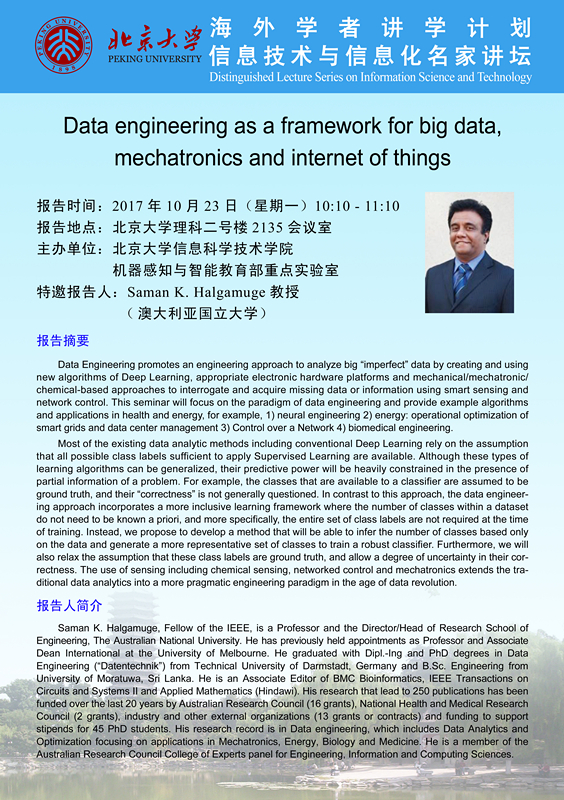报告摘要:
Data Engineering promotes an engineering approach to analyze big “imperfect” data by creating and using new algorithms of Deep Learning, appropriate electronic hardware platforms and mechanical/mechatronic/chemical-based approaches to interrogate and acquire missing data or information using smart sensing and network control. This seminar will focus on the paradigm of data engineering and provide example algorithms and applications in health and energy, for example, 1) neural engineering 2) energy: operational optimization of smart grids and data center management 3) Control over a Network 4) biomedical engineering.
Most of the existing data analytic methods including conventional Deep Learning rely on the assumption that all possible class labels sufficient to apply Supervised Learning are available. Although these types of learning algorithms can be generalized, their predictive power will be heavily constrained in the presence of partial information of a problem. For example, the classes that are available to a classifier are assumed to be ground truth, and their “correctness” is not generally questioned.In contrast to this approach, the data engineering approach incorporates a more inclusive learning framework where the number of classes within a dataset do not need to be known a priori, and more specifically, the entire set of class labels are not required at the time of training. Instead, we propose to develop a method that will be able to infer the number of classes based only on the data and generate a more representative set of classes to train a robust classifier. Furthermore, we will also relax the assumption that these class labels are ground truth, and allow a degree of uncertainty in their correctness. The use of sensing including chemical sensing, networked control and mechatronics extends the traditional data analytics into a more pragmatic engineering paradigm in the age of data revolution.
报告人简介:
Saman K. Halgamuge, Fellow of the IEEE, is a Professor and the Director/Head of Research School of Engineering, The Australian National University. He has previously held appointments as Professor and Associate Dean International at the University of Melbourne. He graduated with Dipl.-Ing and PhD degrees in Data Engineering (“Datentechnik”) from Technical University of Darmstadt, Germany and B.Sc. Engineering from University of Moratuwa, Sri Lanka. He is an Associate Editor of BMC Bioinformatics, IEEE Transactions on Circuits and Systems II and Applied Mathematics (Hindawi). His research that lead to 250 publications has been funded over the last 20 years by Australian Research Council (16 grants), National Health and Medical Research Council (2 grants), industry and other external organizations (13 grantsorcontracts) and funding to support stipends for 45 PhD students. His research record is in Data engineering, which includes Data Analytics and Optimization focusing on applications in Mechatronics, Energy, Biology and Medicine. He is a member of the Australian Research Council College of Experts panel for Engineering, Information and Computing Sciences.

